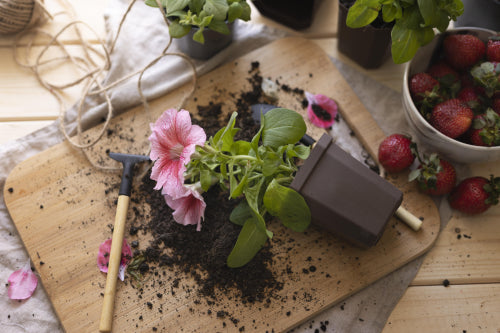Quick Listen:
Gardening is a rewarding hobby that allows you to grow your own fresh produce, create beautiful landscapes, and enjoy the satisfaction of nurturing plants. However, maintaining a garden can often become expensive and time-consuming. Fortunately, eco-friendly gardening practices offer an effective solution to help you reduce both the financial and labor demands of gardening while also being kind to the environment.
In this article, we'll explore five simple yet powerful eco-friendly gardening hacks that save time and money. From composting and rainwater harvesting to using natural pest control, these sustainable gardening tips will help you promote a healthier garden while cutting costs and reducing the environmental impact of your gardening efforts.
1. Composting: Turn Waste into Valuable Fertilizer
Composting is one of the most effective ways to reduce waste while enriching your garden soil. By recycling natural organic material, such as kitchen scraps, garden waste, and even coffee grounds, you can create nutrient-rich compost that improves soil structure, moisture retention, and overall plant health.
How It Saves Time and Money
Instead of buying expensive fertilizers or soil amendments, compost allows you to produce your own, effectively closing the loop on waste. Composting not only saves money but also reduces the need for frequent trips to the garden center. Over time, your garden will become more self-sufficient, needing less intervention and reducing the frequency of purchases.
Getting Started
To start composting, you don't need a fancy system. You can easily create a compost pile in a corner of your yard or use a compost bin for a more organized approach. The key is to balance green materials (like fruit and vegetable scraps, grass clippings, and coffee grounds) with brown materials (like leaves, straw, and cardboard). Keep your compost moist and turn it regularly to speed up the decomposition process. In just a few months, you'll have rich, crumbly compost ready to use in your garden.
2. Rainwater Harvesting: Harness Nature's Resources
Watering your garden can be one of the biggest ongoing expenses, especially in areas that experience hot, dry summers. By collecting rainwater, you can significantly reduce your reliance on municipal water sources and lower your water bill, all while helping conserve precious natural resources.
How It Saves Time and Money
Rainwater harvesting systems are relatively easy to install and can be tailored to your garden's needs. Instead of using tap water to irrigate your plants, you'll have a free and natural water source, which is often better for plants due to its lack of chlorine and other chemicals found in municipal water. Collecting rainwater also reduces the need for frequent watering, saving you time spent on maintenance.
How to Set It Up
To set up a rainwater harvesting system, install a rain barrel or a series of barrels underneath downspouts to catch rainwater from your roof. You can purchase pre-made rain barrels or create your own using repurposed containers. Adding a simple filtration system will ensure the water stays clean and free from debris. If you have a larger garden, consider investing in a more extensive rainwater collection system with a pump to distribute water more efficiently.
3. Mulching: Reduce Watering and Weed Growth
Mulch is an often-overlooked yet invaluable gardening tool. Mulch is any material spread over the soil surface to conserve moisture, suppress weeds, and regulate soil temperature. Whether you use organic materials like wood chips, straw, or leaves, or inorganic options like gravel, mulch offers a host of benefits for your garden.
How It Saves Time and Money
Mulching reduces the need for frequent watering by slowing down evaporation and retaining moisture in the soil. This means you won't have to water your plants as often, saving both time and money. It also minimizes weed growth, meaning less time spent weeding, and reduces the need for expensive weed killers. Over time, mulching can even improve your soil structure, creating a healthier and more sustainable garden.
How to Apply Mulch
To apply mulch, spread a 2- to 4-inch layer over the soil around your plants, ensuring that it doesn't touch the stems or trunks. Organic mulches, such as straw, grass clippings, or wood chips, will break down over time and enrich the soil. If you're using inorganic mulch, like pebbles or rubber, it won't decompose, but it can still be effective in moisture retention and weed suppression.
4. Natural Pest Control: Protect Your Plants Without Chemicals
Pests are a common issue in gardens, but many store-bought pesticides can harm the environment, beneficial insects, and even your plants. Eco-friendly pest control strategies allow you to protect your garden from unwanted pests without resorting to harmful chemicals.
How It Saves Time and Money
By using natural methods to control pests, you can reduce the time spent spraying pesticides, waiting for treatments to take effect, and worrying about harmful side effects. Many natural pest control options are inexpensive or even free, helping you save money compared to buying chemical pesticides regularly. Plus, eco-friendly pest control supports biodiversity in your garden, creating a healthier, more balanced ecosystem.
Eco-Friendly Pest Control Methods
There are several ways to control pests naturally:
Beneficial Insects: Encourage predators like ladybugs, lacewings, and predatory beetles, which can help reduce pest populations. You can even purchase these beneficial insects online and introduce them to your garden.
Neem Oil: This natural oil disrupts the lifecycle of pests and can be used as a safe alternative to chemical insecticides. It's effective against a variety of pests, including aphids, caterpillars, and whiteflies.
Diatomaceous Earth: This powder, made from fossilized remains of aquatic organisms, is a natural insecticide that kills pests by drying them out. It's safe for humans, pets, and beneficial insects when applied properly.
Companion Planting: Certain plants, like marigolds, basil, and garlic, can repel pests naturally. By planting these next to your vegetables or flowers, you can keep unwanted pests at bay without chemical treatments.
5. Native Plants: Low Maintenance and Sustainable Gardening
Using native plants in your garden is one of the best eco-friendly gardening practices. Native plants are naturally adapted to your local climate, soil, and ecosystem, making them easier to care for and more resistant to pests and diseases.
How It Saves Time and Money
Native plants require less water, fertilizer, and pest control than non-native species, reducing the amount of time and money you spend maintaining your garden. Since they're suited to the local environment, native plants are more drought-tolerant and thrive with minimal care. Additionally, many native plants provide habitat for local wildlife, which supports biodiversity and strengthens the health of the ecosystem.
Choosing Native Plants
To choose the right native plants for your garden, consult local gardening resources or native plant societies for recommendations. Focus on plants that are adapted to your climate, soil type, and light conditions. Some popular native plants include coneflowers, black-eyed Susans, and milkweed, which attract pollinators like bees and butterflies.
Save Time and Money
By adopting these five eco-friendly gardening hackscomposting, rainwater harvesting, mulching, natural pest control, and using native plantsyou can create a more sustainable garden that saves both time and money. These practices not only help reduce your environmental footprint but also promote a healthier, more resilient garden ecosystem. Whether you're a seasoned gardener or just starting out, these eco-friendly strategies are simple to implement and will pay off in the long run, helping you achieve a thriving, cost-effective garden.
So, take the plunge into eco-friendly gardening today and start reaping the rewards of a greener, more sustainable garden!
You may also be interested in: Anleitungen zur Pflanzenpflege in Lechuza-Produkten ...
Discover your gardening joy with a top selection. Your joy and green happiness begin here. Shop Now
Powered by flareAI.

